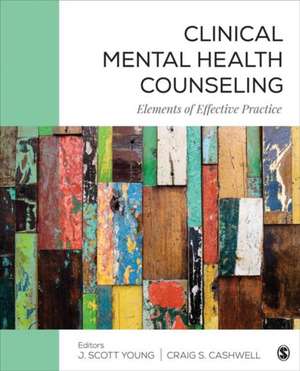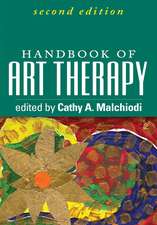Clinical Mental Health Counseling: Elements of Effective Practice
Editat de J. Scott Young, Craig S. Cashwellen Limba Engleză Paperback – 16 oct 2016
Preț: 793.32 lei
Preț vechi: 1086.73 lei
-27% Nou
Puncte Express: 1190
Preț estimativ în valută:
151.82€ • 157.92$ • 125.34£
151.82€ • 157.92$ • 125.34£
Carte tipărită la comandă
Livrare economică 14-28 aprilie
Preluare comenzi: 021 569.72.76
Specificații
ISBN-13: 9781506305639
ISBN-10: 1506305636
Pagini: 480
Dimensiuni: 187 x 232 x 25 mm
Greutate: 0.79 kg
Ediția:1
Editura: SAGE Publications
Colecția Sage Publications, Inc
Locul publicării:Thousand Oaks, United States
ISBN-10: 1506305636
Pagini: 480
Dimensiuni: 187 x 232 x 25 mm
Greutate: 0.79 kg
Ediția:1
Editura: SAGE Publications
Colecția Sage Publications, Inc
Locul publicării:Thousand Oaks, United States
Recenzii
“Having gathered a plethora of established experts in the field of mental health counseling, the editors packed this book with content that will meet or exceed the curricular needs of any graduate counseling course; ‘comprehensive’ is an understatement!”
“An instant classic. Young and Cashwell have assembled a stellar group of counselor education authors and produced an outstanding, comprehensive, and easy-to-read text that clearly articulates and elevates the discipline of clinical mental health counseling. This book covers everything a CMHC needs to hit the ground running in clinical practice!”
“A ‘must-have’ resource for anyone looking for a comprehensive and reader-friendly clinical mental health counseling text! The introductory chapter provides a solid context for the ensuing chapters that focus on specific topics (such as legal/ethical issues, diagnosis, supervision), all authored by leading experts. It’s all here—everything that learners need to know as they embark on their professional journeys to becoming CMHCs.”
“Clinical Mental Health Counseling: Elements of Effective Practice is a great text for introducing students to the roles and functions of clinical mental health counseling. The authors have organized the material in a clear and engaging level which makes it appropriate for students. I particularly appreciate the documentation and evidence-based sections.”
“The authors have succeeded in building a very comprehensive book, focused on the CACREP standards, that is up to date and gives new and also practical information regarding the profession. There are some chapters that are very unique for an introductory textbook (e.g., chapters devoted to billing, documentation, psychopharmacology, neuroscience, a full chapter on research). There is also some cutting-edge information included on evidence based practices. Usually, there isn’t an entire chapter devoted to advocacy. Thus, instructors have to supplement the information in textbooks with the ACA Advocacy Competencies and various articles and examples. The chapter on advocacy is a treasure because it is comprehensive and really introduces the students to the counselor advocacy role up front!”
“The authors were able to invite contributors that are known experts in their field. They write from a strong theoretical base and are practitioners in their areas of expertise.”
“This book provides the most comprehensive knowledge, skills, and applications about mental health practice in community settings.”
“By offering a text that can provide a thorough foundation for counselor trainees, Young & Cashwell have offered Counselor Educators a much-needed tool for bridging a significant gap in counselor training.”
“Clinical Mental Health Counseling: Elements of Effective Practice is current, thorough, and student friendly.”
“Clinical Mental Health Counseling: Elements of Effective Practice is a comprehensive overview of a complex topic.”
“An instant classic. Young and Cashwell have assembled a stellar group of counselor education authors and produced an outstanding, comprehensive, and easy-to-read text that clearly articulates and elevates the discipline of clinical mental health counseling. This book covers everything a CMHC needs to hit the ground running in clinical practice!”
“A ‘must-have’ resource for anyone looking for a comprehensive and reader-friendly clinical mental health counseling text! The introductory chapter provides a solid context for the ensuing chapters that focus on specific topics (such as legal/ethical issues, diagnosis, supervision), all authored by leading experts. It’s all here—everything that learners need to know as they embark on their professional journeys to becoming CMHCs.”
“Clinical Mental Health Counseling: Elements of Effective Practice is a great text for introducing students to the roles and functions of clinical mental health counseling. The authors have organized the material in a clear and engaging level which makes it appropriate for students. I particularly appreciate the documentation and evidence-based sections.”
“The authors have succeeded in building a very comprehensive book, focused on the CACREP standards, that is up to date and gives new and also practical information regarding the profession. There are some chapters that are very unique for an introductory textbook (e.g., chapters devoted to billing, documentation, psychopharmacology, neuroscience, a full chapter on research). There is also some cutting-edge information included on evidence based practices. Usually, there isn’t an entire chapter devoted to advocacy. Thus, instructors have to supplement the information in textbooks with the ACA Advocacy Competencies and various articles and examples. The chapter on advocacy is a treasure because it is comprehensive and really introduces the students to the counselor advocacy role up front!”
“The authors were able to invite contributors that are known experts in their field. They write from a strong theoretical base and are practitioners in their areas of expertise.”
“This book provides the most comprehensive knowledge, skills, and applications about mental health practice in community settings.”
“By offering a text that can provide a thorough foundation for counselor trainees, Young & Cashwell have offered Counselor Educators a much-needed tool for bridging a significant gap in counselor training.”
“Clinical Mental Health Counseling: Elements of Effective Practice is current, thorough, and student friendly.”
“Clinical Mental Health Counseling: Elements of Effective Practice is a comprehensive overview of a complex topic.”
Cuprins
Preface
About the Editors and Contributors
SECTION I FRAMEWORK OF CLINICAL MENTAL HEALTH COUNSELING
1 History and Evolution of Clinical Mental Health Counseling - Kerrie K. Fuenfhausen, Scott Young, Craig Cashwell, and Muthoni Musangali
Foundational Principles of Counseling
Wellness Model of Mental Health
Developmental Perspective
Prevention and Early Intervention
Empowerment
Multicultural Worldview
History of CMH Counseling
Historical Influences
Professional Practice in CMH Counseling
Professional Identity
Qualifications
Models of Change
Roles and Functions of CMH Counselors
CMH Counselor Functions
CMH Counselor Roles
Populations Served
Case Study
References
2 Legal and Ethical Issues 31 - Jamie Crockett
What Is Professional Conduct?
Consult, Consult, Consult!
Moral Principles
Professional Standards for Ethical Practice
Legal Considerations
Legal and Ethical Challenges
Ethical Decision Making
Multicultural and Social Justice Considerations
Case Studies
Select Resources for Ethical and Legal CMH Counseling Practice
References
3 Advocacy and Social Justice - Catherine Y. Chang, Simone Lambert, and Emily Goodman-Scott
The Case of Yolanda
Ecological View
Case Study Discussion
Understanding Advocacy and Social Justice
Case Study
Multicultural Competence and Culturally Responsive CMH Counseling
Case Study Discussion
Social Injustice and Mental Health
Privilege and Oppression
Privilege
Oppression
Racism and Sexism
Racism
Case Study Discussion
Sexism
Case Study Discussion
Advocacy and Social Justice Counseling
Client Advocacy
Case Study Discussion
Professional Advocacy
Case Study Discussion
Global Perspectives on Counseling
Conclusion
References
4 Continuum of Care - Amy Banner
Continuum of Care: One Size Does Not Fit All
Modalities of the CMH Counseling Continuum of Care
Individual Counseling
Group Counseling
Couple and Family Counseling
History of the CMH Counseling Continuum of Care
Ethical and Developmental Aspects of the CMH Counseling Continuum of Care
Services, Settings, and Roles Across the CMH Counseling Continuum of Care
Prevention and Education Services
Outpatient Services
In-Home Services
Partial Hospitalization Programs (PHPs) and Intensive Outpatient (IOP) Services
Inpatient Services
Residential Services
Aftercare
Crisis and Emergency Services
Professional Issues Affecting the CMH Counseling Continuum of Care
Case Study
References
SECTION II PROCESSES AND PROCEDURES OF CLINICAL MENTAL HEALTH COUNSELING
5 Assessing Client Concerns - Casey Barrio-Minton
Assessment Foundations
Purposes and Methods of Assessment
Clinical, Intake, and Diagnostic Interviewing
Types of Interviews
Initial or Intake Interview
Unstandardized Questionnaires and Checklists
Mental Status Examinations
Mini–Mental State Exam
Using Standardized Tests and Inventories to Inform Counseling
Broad-Symptom Inventories
Specific-Symptom Inventories
Structured Personality Inventories
Projective Techniques
Qualitative Assessment
Collateral Sources
Screening for High-Risk Situations
General Medical Conditions
Suicide Risk
Violence Risk
Intimate Partner Violence and Abuse
Substance Concerns
Cultural Bias in Assessment
Using Assessment to Inform Counseling
Case Study
References
Appendix: Current Concerns Questionnaire and Checklist (Adult)
6 Diagnosis - Gary Gintner
Psychopathology and Etiology
Mental Health and Mental Illness
Dimensions of Psychopathology
Etiological Factors and the Biopsychosocial Model
Diagnostic Issues With the DSM
DSM: A Look Backward
DSM-5
Diagnostic Process: Four Guiding Principles
Principle 1: Check the Adequacy of Your Information
Principle 2: Use Diagnostic Hierarchies for Differential Diagnosis
Principle 3: Resolve Diagnostic Uncertainty by Examining the Usual Suspects
Principle 4: Your Diagnosis Is a Hypothesis That May Need Correcting
Case Study
References
7 Treatment Planning - Daniel M. Paredes and Maria A. Brunelli Paredes
Determining Client Needs and Appropriate Services
Case of Tara
From Conceptualization to Treatment Planning
Personal Style
Counselor Theoretical Framework
Expectations of the Counselor’s Work Setting
Developing and Implementing Treatment Plans
Treatment Goals
Case of Joseph and Sophia
Treatment Objectives
Treatment Interventions
Additional Treatment Plan Components
Referral, Keeping a Resource List, and Application
Keeping a Resource List
Application
Case of Emily
Termination Versus Maintenance
Treatment Planning and Special Populations
Treatment Planning With Children and Adolescents
Treatment Planning With Mandated Clients
Case Study
References
8 Psychiatry and Psychopharmacology - Todd Lewis and John Culbreth
Brain Physiology, Neurotransmitters, and Medication: A Basic Overview
Mechanisms of Action
Why Use Medication in the Treatment of Mental Disorders?
Controversy in Using Medication in the Treatment of Mental Disorders
The Mental Health Counselor’s Dilemma
Classes of Psychotropic Medications, Their Effects, and Side Effects
Antidepressant Medications
Antianxiety Medications
Antipsychotic Medications
Bipolar Medications
Working Effectively With Psychiatrists
Making Medication Referrals
Medication Compliance
Assessing and Managing Side Effects
Working Effectively With Clients and Medication
Talking to Clients About Medication
Medication Advocacy
Legal and Ethical Issues With Psychopharmacology
Case Study
References
9 Managed Care, Billing, and Documentation - Laura Welfare, Paige Greason, and Keith Mobley
Managed Care
Managed Care Laws and Legislation
Health Insurance Portability and Accountability Act (HIPAA)
HIPAA Privacy Rule
HIPAA Security Rule
HIPAA Enforcement
Mental Health Parity and Addiction Equity Act
Affordable Care Act
Managed Care: Becoming an Approved Provider
Insurance: Private and Public Payers
Private Insurance
Government-Sponsored Insurance
Self-Pay and Other Means
Maintaining Records
Importance of Paperwork
Administrative and Clinical Documentation Practices
Clinical Documentation Practices
Intake Assessment Forms
Screening and Outcome Measures
Clinical Case Notes
Conclusion
Case Study 1: Navigating Insurance Coverage
Case Study 2: Writing Eff ective Case Notes
References
Appendix: Personal History and Intake Form
10 Crisis Management and Disaster Relief - Amber L. Pope and Allison Marsh Pow
Differentiating Crisis Management and Disaster Relief
Crisis Management
What Is a Crisis?
Crisis Counseling
Range of Individual Crises
Principles of Crisis Management
Crisis Management Planning
Emergency and Disaster Relief
Impact of Crises and Disasters
Factors Influencing Mental Health After an Emergency or Disaster
Groups at Risk
Emergency and Disaster Response
Immediate Interventions
Intermediate and Long-Term Interventions
Disaster Mental Health Training
Impact of Crisis Counseling and Disaster Relief Work on CMH Counselors
Case Study 1: Crisis Management
Case Study 2: Disaster Mental Health
References
SECTION III MAXIMIZING YOUR EFFECTIVENESS AS A CLINICAL MENTAL HEALTH COUNSELOR
11 The Importance of Clinical Supervision to Effective Practice - DiAnne Borders
Models of Clinical Supervision
Developmental Models
Discrimination Model
Peer Models
Group Supervision Models
Triadic Supervision
Maximizing Your Supervision Experience
Practice Self-Assessment and Create Learning Goals
Prepare for Supervision
Take Risks
Practice Self-Reflection
Consider Power and Authority; Evaluation and Feedback
Practice Peer Feedback in Triadic and Group Supervision
Bring Difficult Topics to Supervision
Poor Supervision
Conclusion
Case Study
References
12 Wellness, Self-Care, and Burnout Prevention - Gerard Lawson and Jennifer M. Cook
CMH Counseling Risks and Challenges
High-Touch Hazards
Burnout
What Burnout Looks Like
Burnout Prevention
Vicarious Traumatization
Symptoms and Signs of Vicarious Trauma
Addressing Vicarious Trauma
Compassion Fatigue
Compassion Fatigue Described
Contributing Factors to Compassion Fatigue
Identifying Compassion Fatigue
Counselor Wellness
Mindfulness
Mindfulness Defined
Balance
Career-Sustaining Behaviors
Healthy Habits
Case Study
References
13 Using Research to Improve Clinical Practice - Kelly L. Wester and Tamarine Foreman
Research Defined and Described
Ways of Knowing
Evidence-Based Practice
Scientist-Practitioner Model
Case Study
Step 1: Assess the Client
Step 2: Create a Well-Formulated Question
Step 3: Conduct a Search for Evidence
Step 4: Select and Access Articles to Read
Step 5: Evaluate and Appraise the Quality of Research
Step 6: Synthesize Information
Step 7: Clinical Application
Step 8: Evaluation
Conclusion
References
SECTION IV CURRENT AND FUTURE TRENDS IN CLINICAL MENTAL HEALTH PRACTICE
14 The Applications of Neuroscience to Clinical Mental Health Counseling - Jane E. Myers and Laura Jones
Neuroscience in Counseling
Neural Anatomy
Neuroscience and the Therapeutic Relationship
Therapeutic Process and Neuroplasticity
Neurofeedback: One Application of Neuroscience in Practice
What Is Neurofeedback and How Does It Work?
Case Study
Conclusion
References
15 Emerging Approaches to Clinical Mental Health Counseling - Amanda L. Giordano, Philip B. Clarke, Cheryl L. Fulton, and Tammy H. Cashwell
Motivational Interviewing
The Basics of MI
Support for MI
MI in Practice
Case Study
Emotionally Focused Couple Therapy
The Basics of EFT
Stage 1: Deescalation of Negative Cycles of Interaction
Stage 2: Changing Interactional Positions
Stage 3: Consolidation and Integration
Support for EFT
EFT in Practice
Case Study
Dialectical Behavior Therapy
The Basics of DBT
Support for DBT
DBT in Practice
Case Study
Interpersonal Psychotherapy
The Basics of IPT
Support for IPT
IPT in Practice
Case Study
Trauma-Focused Cognitive Behavioral Therapy (TF-CBT)
The Basics of TF-CBT
Support for TF-CBT
TF-CBT in Practice
Case Study
Mindfulness
The Basics of Mindfulness
Support for Mindfulness
Mindfulness in Practice
Case Study
Acceptance and Commitment Therapy
The Basics of ACT
Support for ACT
ACT in Practice
Case Study
Spirituality in Counseling
The Basics of Spirituality in Counseling
Support for Spirituality in Counseling
Spirituality in Counseling in Practice
Case Study
Conclusion
References
Index
About the Editors and Contributors
SECTION I FRAMEWORK OF CLINICAL MENTAL HEALTH COUNSELING
1 History and Evolution of Clinical Mental Health Counseling - Kerrie K. Fuenfhausen, Scott Young, Craig Cashwell, and Muthoni Musangali
Foundational Principles of Counseling
Wellness Model of Mental Health
Developmental Perspective
Prevention and Early Intervention
Empowerment
Multicultural Worldview
History of CMH Counseling
Historical Influences
Professional Practice in CMH Counseling
Professional Identity
Qualifications
Models of Change
Roles and Functions of CMH Counselors
CMH Counselor Functions
CMH Counselor Roles
Populations Served
Case Study
References
2 Legal and Ethical Issues 31 - Jamie Crockett
What Is Professional Conduct?
Consult, Consult, Consult!
Moral Principles
Professional Standards for Ethical Practice
Legal Considerations
Legal and Ethical Challenges
Ethical Decision Making
Multicultural and Social Justice Considerations
Case Studies
Select Resources for Ethical and Legal CMH Counseling Practice
References
3 Advocacy and Social Justice - Catherine Y. Chang, Simone Lambert, and Emily Goodman-Scott
The Case of Yolanda
Ecological View
Case Study Discussion
Understanding Advocacy and Social Justice
Case Study
Multicultural Competence and Culturally Responsive CMH Counseling
Case Study Discussion
Social Injustice and Mental Health
Privilege and Oppression
Privilege
Oppression
Racism and Sexism
Racism
Case Study Discussion
Sexism
Case Study Discussion
Advocacy and Social Justice Counseling
Client Advocacy
Case Study Discussion
Professional Advocacy
Case Study Discussion
Global Perspectives on Counseling
Conclusion
References
4 Continuum of Care - Amy Banner
Continuum of Care: One Size Does Not Fit All
Modalities of the CMH Counseling Continuum of Care
Individual Counseling
Group Counseling
Couple and Family Counseling
History of the CMH Counseling Continuum of Care
Ethical and Developmental Aspects of the CMH Counseling Continuum of Care
Services, Settings, and Roles Across the CMH Counseling Continuum of Care
Prevention and Education Services
Outpatient Services
In-Home Services
Partial Hospitalization Programs (PHPs) and Intensive Outpatient (IOP) Services
Inpatient Services
Residential Services
Aftercare
Crisis and Emergency Services
Professional Issues Affecting the CMH Counseling Continuum of Care
Case Study
References
SECTION II PROCESSES AND PROCEDURES OF CLINICAL MENTAL HEALTH COUNSELING
5 Assessing Client Concerns - Casey Barrio-Minton
Assessment Foundations
Purposes and Methods of Assessment
Clinical, Intake, and Diagnostic Interviewing
Types of Interviews
Initial or Intake Interview
Unstandardized Questionnaires and Checklists
Mental Status Examinations
Mini–Mental State Exam
Using Standardized Tests and Inventories to Inform Counseling
Broad-Symptom Inventories
Specific-Symptom Inventories
Structured Personality Inventories
Projective Techniques
Qualitative Assessment
Collateral Sources
Screening for High-Risk Situations
General Medical Conditions
Suicide Risk
Violence Risk
Intimate Partner Violence and Abuse
Substance Concerns
Cultural Bias in Assessment
Using Assessment to Inform Counseling
Case Study
References
Appendix: Current Concerns Questionnaire and Checklist (Adult)
6 Diagnosis - Gary Gintner
Psychopathology and Etiology
Mental Health and Mental Illness
Dimensions of Psychopathology
Etiological Factors and the Biopsychosocial Model
Diagnostic Issues With the DSM
DSM: A Look Backward
DSM-5
Diagnostic Process: Four Guiding Principles
Principle 1: Check the Adequacy of Your Information
Principle 2: Use Diagnostic Hierarchies for Differential Diagnosis
Principle 3: Resolve Diagnostic Uncertainty by Examining the Usual Suspects
Principle 4: Your Diagnosis Is a Hypothesis That May Need Correcting
Case Study
References
7 Treatment Planning - Daniel M. Paredes and Maria A. Brunelli Paredes
Determining Client Needs and Appropriate Services
Case of Tara
From Conceptualization to Treatment Planning
Personal Style
Counselor Theoretical Framework
Expectations of the Counselor’s Work Setting
Developing and Implementing Treatment Plans
Treatment Goals
Case of Joseph and Sophia
Treatment Objectives
Treatment Interventions
Additional Treatment Plan Components
Referral, Keeping a Resource List, and Application
Keeping a Resource List
Application
Case of Emily
Termination Versus Maintenance
Treatment Planning and Special Populations
Treatment Planning With Children and Adolescents
Treatment Planning With Mandated Clients
Case Study
References
8 Psychiatry and Psychopharmacology - Todd Lewis and John Culbreth
Brain Physiology, Neurotransmitters, and Medication: A Basic Overview
Mechanisms of Action
Why Use Medication in the Treatment of Mental Disorders?
Controversy in Using Medication in the Treatment of Mental Disorders
The Mental Health Counselor’s Dilemma
Classes of Psychotropic Medications, Their Effects, and Side Effects
Antidepressant Medications
Antianxiety Medications
Antipsychotic Medications
Bipolar Medications
Working Effectively With Psychiatrists
Making Medication Referrals
Medication Compliance
Assessing and Managing Side Effects
Working Effectively With Clients and Medication
Talking to Clients About Medication
Medication Advocacy
Legal and Ethical Issues With Psychopharmacology
Case Study
References
9 Managed Care, Billing, and Documentation - Laura Welfare, Paige Greason, and Keith Mobley
Managed Care
Managed Care Laws and Legislation
Health Insurance Portability and Accountability Act (HIPAA)
HIPAA Privacy Rule
HIPAA Security Rule
HIPAA Enforcement
Mental Health Parity and Addiction Equity Act
Affordable Care Act
Managed Care: Becoming an Approved Provider
Insurance: Private and Public Payers
Private Insurance
Government-Sponsored Insurance
Self-Pay and Other Means
Maintaining Records
Importance of Paperwork
Administrative and Clinical Documentation Practices
Clinical Documentation Practices
Intake Assessment Forms
Screening and Outcome Measures
Clinical Case Notes
Conclusion
Case Study 1: Navigating Insurance Coverage
Case Study 2: Writing Eff ective Case Notes
References
Appendix: Personal History and Intake Form
10 Crisis Management and Disaster Relief - Amber L. Pope and Allison Marsh Pow
Differentiating Crisis Management and Disaster Relief
Crisis Management
What Is a Crisis?
Crisis Counseling
Range of Individual Crises
Principles of Crisis Management
Crisis Management Planning
Emergency and Disaster Relief
Impact of Crises and Disasters
Factors Influencing Mental Health After an Emergency or Disaster
Groups at Risk
Emergency and Disaster Response
Immediate Interventions
Intermediate and Long-Term Interventions
Disaster Mental Health Training
Impact of Crisis Counseling and Disaster Relief Work on CMH Counselors
Case Study 1: Crisis Management
Case Study 2: Disaster Mental Health
References
SECTION III MAXIMIZING YOUR EFFECTIVENESS AS A CLINICAL MENTAL HEALTH COUNSELOR
11 The Importance of Clinical Supervision to Effective Practice - DiAnne Borders
Models of Clinical Supervision
Developmental Models
Discrimination Model
Peer Models
Group Supervision Models
Triadic Supervision
Maximizing Your Supervision Experience
Practice Self-Assessment and Create Learning Goals
Prepare for Supervision
Take Risks
Practice Self-Reflection
Consider Power and Authority; Evaluation and Feedback
Practice Peer Feedback in Triadic and Group Supervision
Bring Difficult Topics to Supervision
Poor Supervision
Conclusion
Case Study
References
12 Wellness, Self-Care, and Burnout Prevention - Gerard Lawson and Jennifer M. Cook
CMH Counseling Risks and Challenges
High-Touch Hazards
Burnout
What Burnout Looks Like
Burnout Prevention
Vicarious Traumatization
Symptoms and Signs of Vicarious Trauma
Addressing Vicarious Trauma
Compassion Fatigue
Compassion Fatigue Described
Contributing Factors to Compassion Fatigue
Identifying Compassion Fatigue
Counselor Wellness
Mindfulness
Mindfulness Defined
Balance
Career-Sustaining Behaviors
Healthy Habits
Case Study
References
13 Using Research to Improve Clinical Practice - Kelly L. Wester and Tamarine Foreman
Research Defined and Described
Ways of Knowing
Evidence-Based Practice
Scientist-Practitioner Model
Case Study
Step 1: Assess the Client
Step 2: Create a Well-Formulated Question
Step 3: Conduct a Search for Evidence
Step 4: Select and Access Articles to Read
Step 5: Evaluate and Appraise the Quality of Research
Step 6: Synthesize Information
Step 7: Clinical Application
Step 8: Evaluation
Conclusion
References
SECTION IV CURRENT AND FUTURE TRENDS IN CLINICAL MENTAL HEALTH PRACTICE
14 The Applications of Neuroscience to Clinical Mental Health Counseling - Jane E. Myers and Laura Jones
Neuroscience in Counseling
Neural Anatomy
Neuroscience and the Therapeutic Relationship
Therapeutic Process and Neuroplasticity
Neurofeedback: One Application of Neuroscience in Practice
What Is Neurofeedback and How Does It Work?
Case Study
Conclusion
References
15 Emerging Approaches to Clinical Mental Health Counseling - Amanda L. Giordano, Philip B. Clarke, Cheryl L. Fulton, and Tammy H. Cashwell
Motivational Interviewing
The Basics of MI
Support for MI
MI in Practice
Case Study
Emotionally Focused Couple Therapy
The Basics of EFT
Stage 1: Deescalation of Negative Cycles of Interaction
Stage 2: Changing Interactional Positions
Stage 3: Consolidation and Integration
Support for EFT
EFT in Practice
Case Study
Dialectical Behavior Therapy
The Basics of DBT
Support for DBT
DBT in Practice
Case Study
Interpersonal Psychotherapy
The Basics of IPT
Support for IPT
IPT in Practice
Case Study
Trauma-Focused Cognitive Behavioral Therapy (TF-CBT)
The Basics of TF-CBT
Support for TF-CBT
TF-CBT in Practice
Case Study
Mindfulness
The Basics of Mindfulness
Support for Mindfulness
Mindfulness in Practice
Case Study
Acceptance and Commitment Therapy
The Basics of ACT
Support for ACT
ACT in Practice
Case Study
Spirituality in Counseling
The Basics of Spirituality in Counseling
Support for Spirituality in Counseling
Spirituality in Counseling in Practice
Case Study
Conclusion
References
Index
Descriere
With contributions from top experts in the field, this text combines solid foundational information with practical application, presenting students with the realities of working in community mental health settings that they can directly apply to practicum and internship courses.













